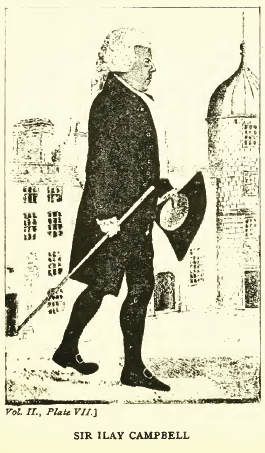Mr. Ilay Campbell was the eldest son of Archibald
Campbell, Esq. of iSuccoth, W.S.; his mother, Helen Wallace, was the
daughter and representative of Wallace of Ellerslie. He was born at
Edinburgh in 1734, and admitted to the bar in 1757. He early acquired
extensive practice, and was one of the counsel for the defender in the
great Douglas Cause. He entered warmly into the spirit of this important
contest, which for a time engrossed the whole of public attention. As an
instance of his enthusiasm, it may be mentioned, that immediately after
the decision in the House of Lords, he posted without delay to
Edinburgh, where, arriving before the despatch, he was the first to
announce the intelligence to the assembled crowds on the streets. At the
Cross, the young lawyer took off his hat, and waving it in the air,
exclaimed—" Douglas for ever !" He was responded to by a joyous shout
from the assembled multitude, who, unyoking the horses from his
carriage, drew him in triumph to his house in James's Court.

During the long period Mr. Campbell remained at the
bar, he enjoyed a continued increase of business; and there was almost
no case of any importance in which he was not engaged or consulted. His
written pleadings are remarkable for their excellence; "many of them are
perfect models of perspicuity, force, and elegance."
In 1783 be was appointed Solicitor-General; in 1784,
Lord Advocate ; and the same year was returned Member of Parliament for
the Glasgow district of burghs. The University of that city at the same
time conferred on him the degree of Doctor of Laws. He also held for
some time the office of Lord Rector. In politics he was warmly attached
to the administration of Pitt, and proved himself an active and
efficient representative.
On the death of Sir Thomas Miller he was promoted to
the Presidentship of the Court of Session; and placed, in 1794, at the
head of the commission of Oyer and Terminer, issued for the trial of
those accused of high treason. In these responsible departments he
acquitted himself in a manner which commanded the respect of all
parties; and the soundness of his recorded opinions on the bench is
attested by the fact that they are still held in high estimation among
the profession.
While yet in the possession of all his faculties, he
resigned the presidency in 1808, apparently from a conscientious desire
to abandon public life before bis mind should be impaired by the
infirmities of age, aud was succeeded by the late President Blair. Upon
the 17th September following he had the honour of a baronetcy conferred
upon him. Although pretty far advanced in years, he was still in
possession of all his mental faculties; and was afterwards chosen to
preside over two different commissions appointed to inquire into the
state ot the Courts of Law in Scotland, which he conducted with his
accustomed industry and talent.
After his retirement from the bench, Sir Hay resided
chiefly on his paternal estate of Garscube, where he lived for many
years. "Until within a few weeks of his death" (which occurred on the
28th of March, 1823, in the eighty-ninth year of his age) " he was
constantly occupied with pursuits of various kinds. He took a principal
share in the business of the county of Dumbarton, and was much consulted
by the magistracy of the neighbourhood, particularly in the late
perilous times [1817-19]. He spent much of bis time in reading, and in
the study of general literature ; amused himself with agriculture ; and
received the visits of those numerous persons in England and Scotland
with whom he had been connected in public and private life.
"In these occupations, and in the exercise of that
benevolence which was a remarkable trait of bis character; possessing,
until his last short illness, perfect good health, and a mind as acute
as it had been in the vigour of his manhood; loved and respected by
every one, and surrounded by his numerous descendants, whom he delighted
to assemble under his patriarchal roof, he enjoyed a period of
retirement from public life, which, in point of happiness and length of
duration, seldom Jails to the lot of public characters, and which was
the deserved reward of those laborious services that will be recollected
as long as the law of Scotland exists."

Sir Hay Campbell was married to Susan-Mary, daughter
of Archibald Murray of Cringletie, Esq., one of the Commissaries of
Edinburgh, by whom he had six daughters and two sons, one of whom only
survives, viz.—the present Sir Archibald Campbell of Succoth, Bart.,
who, since he retired from the bench, resides chiefly at Garscube. The
eldest daughter was married to John Macneil of Oakfield ; the second to
Sir John Connell; the third to Francis Sitwell of Barmoor Castle; the
fourth to Crawford Tait, Esq., W.S.; and the youngest to Walter Dalziel
Colquhoun of Garscadden.

